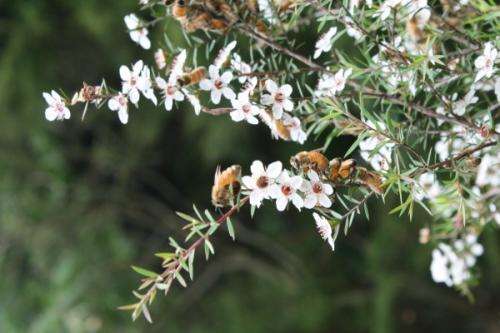Manuka honey opens door for effective treatment of chronic wounds

Manuka honey is highly effective in the treatment of chronic wound infections, according to new UTS research into how honey affects the growth of bacteria.
The research, published today in the open-access science journal PLOS ONE, was particularly important as treatment of chronic wounds is becoming increasingly difficult due to antibiotic resistance, according to Professor Liz Harry, lead researcher from the ithree institute at UTS.
"Honey is an excellent example of where years of evolution can provide an effective, long-term medical solution and our research supports the claim that bacteria will not become resistant to honey," Professor Harry said.
The study examined manuka, kanuka and clover honeys to determine which was the most effective at inhibiting the growth of four types of bacteria commonly found in chronic wounds.
Two key honey ingredients known to inhibit bacterial growth were examined: methylglyoxal (MGO) which is naturally present at high concentrations in manuka honeys; and hydrogen peroxide which is present in many honeys at varying concentrations, including manuka.
"We found that the manuka honeys were the most effective at inhibiting growth of all four types of bacteria," Professor Harry said.
"Interestingly, the key to the effectiveness of honey is its chemical complexity – it contains several chemicals that inhibit bacterial growth, not just MGO."
The research, conducted at the ithree institute in collaboration with New Zealand natural health and beauty products company Comvita, has implications for the way that manuka honey is marketed, and the way consumers understand the products that are available to them.
Natural manuka honey is native to New Zealand, however there are cases where MGO levels in inferior honey products have been increased and then labelled as genuine manuka. Professor Harry warns synthetically altered honeys are no match for the real thing.
"Not all honey is the same, and not all honey labelled 'manuka' is the real thing," Professor Harry said.
"It's really important for clinicians and patients to use natural honey products that have been minimally processed for the best results in treating chronic wounds, and approved for medicinal use by regulatory organisations."
As well as providing valuable information to clinicians and health care consumers, the research will also help Comvita and other companies with an interest in the medicinal use of honey to market their products more effectively.
The research paper can be read in full on the PLOS ONE website.
Journal information: PLoS ONE
Provided by University of Technology, Sydney
















